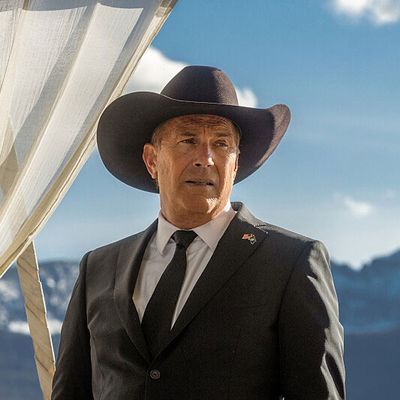
Five seasons into Yellowstone, the show finds itself in an interesting place. It’s more popular than ever; season four averaged 10.4 million total viewers on the Paramount Network, and more spinoffs are in the works, including next month’s prequel 1932 (itself a sequel to 1883) and eventually 6666, which Jimmy’s departure last year spent so much time setting up. Meanwhile, the second season of Taylor Sheridan’s Mayor of Kingstown begins in January, and his new Sylvester Stallone–anchored Tulsa King premiered just last night. Sheridan doesn’t seem concerned about lacking time to devote to this original cash cow, though, and with the explosion of Yellowstone’s viewership, Paramount remains committed to the series. In fact, season five will be 14 episodes instead of just ten, split into two seven-episode chunks.
But despite its record viewership, Yellowstone isn’t necessarily better than ever; season four certainly had its moments, but the show also felt aimless, unsure where it wanted to go.
Luckily, Yellowstone tends to begin its seasons with focused premieres clarifying the general direction of the season. So while “One Hundred Years Is Nothing” doesn’t have nearly the momentum and heart-pounding action of last season’s premiere, it does feel like an effective palate cleanser, transitioning us to this new phase of the show and establishing the primary character groupings.
Toward the end of season four, I felt like John Dutton’s gubernatorial campaign had fallen by the wayside a bit. But when we pick up around seven or eight months later (judging by Monica’s pregnancy), he’s being congratulated for winning the election. Our protagonist is now the governor of Montana, a pretty significant and refreshing change to the basic structure of the show. Most of the premiere deals with that new development: We see John’s opponent, Scott McMullen’s, concession speech (and phone call), John’s victory speech, his swearing in, and the governor’s ball.
What’s interesting here is that John really isn’t drawn to the job at all, a fact he actually admits publicly. He can win people over with his charisma and us-against-them rhetoric, but this isn’t a fun new career move for him; he’d much rather be back at the ranch, riding around or shooting the shit with Rip. But this is a necessary move to preserve that very setting, something he’s very upfront about: In order to make sure Montana still looks like Montana a century from now, he intends to raise taxes for nonresidents and cancel funding for the new developments on Dutton land. And as previous governor (and new senator) Lynelle Perry tells him, his unwillingness to run for reelection in four years is actually an asset. It allows him the freedom not to worry about ruffling any feathers or impacting any long-term political aspirations.
Besides Lynelle, John’s other main scene partners in the premiere are Beth and Jamie. They make a good group with similar goals but different ways of getting shit done. Jamie advises John against jeopardizing the airport funding; the ranch needs the money that Market Equities’ developments could bring, and it might actually be illegal to back out now. But as Beth reminds Jamie, it’s his job to deal with the legality. He’s completely at Beth and John’s mercy now that they have footage of him with his biological dad, Garrett Randall’s, body. (I still feel skeptical that this would work as leverage, since the bodies disposed of at the “train station” implicate everyone, but whatever.)
The threat of Market Equities is still there with Jacki Weaver chewing more scenery than ever as Caroline Warner. And the impending collapse of their developments might be bad news for Chief Rainwater, who agreed to let Market Equities move forward with construction in exchange for funding his new luxury casino early last season. (Later episodes never really followed up on this.) But most of this episode is more focused on John’s mixed feelings about his new role than any real new threats. The governor’s ball is the first time he’s been on the ranch in a month — is it really worth fighting to keep the place if he’s missing out on what little time he has left there? Rip, for one, isn’t optimistic; amid the jubilee of dancing cowboys, he cryptically tells Beth, “He’s going to lose this place.”
It’s not the only bad omen of “One Hundred Years Is Nothing,” which ends with a sudden tragedy: Monica loses her baby boy after crashing her car into a bison on the way to the hospital. It’s too early to tell what to think of this, but it’s more startling so far than really heartbreaking with Monica otherwise missing from the premiere. It feels a little shoehorned in — much like this episode’s random flashback to a teenage Beth and Rip going on a date in town, where Beth explains her system of using her sexuality to get what she wants. He’s jealous and angry, but his departure only leads to Beth punishing him by later making out with another ranch hand right in front of his face.
I’m a little unclear on what purpose this flashback serves besides explaining something we already know about Beth, and the scene that follows — in which present-day Beth wakes up and weepingly apologizes to Rip for how awfully she treated him back on the day — is even stranger. I suppose the idea is that when Beth isn’t in attack mode and doesn’t have an outlet for her anger, she ends up turning it on herself. But that’s what Jamie is for, isn’t he? Beth will have another enemy before long, either someone new or her old enemies at Market Equities. She’s the most entertaining not when she’s making up reasons to throw a tantrum, but when she has a real, worthy target. And from the looks of this premiere, there will be plenty more foes to come.
The Last Round-up
• Carter Corner: We get one brief Carter appearance right near the end! He looks like he’s aged five years in half of one, which freaks out both John and myself.
• Our first glimpse of Kayce is an action scene at the Canadian border, where he rounds up some horse thieves before they can cross over and avoid American prison. He’s able to persuade the Canadian police to return their lost horses without handing them the thieves in exchange, so um, go USA, I guess.
• Not a ton from the bunkhouse gang yet, and I’m curious to see how Sheridan keeps those characters relevant when so much time might be spent in the capital this season. But it feels nice to see them shooting the shit and having fun again. Jokes about Jake wearing a dress shouldn’t be that funny in theory, but Jake Ream’s expressions of genuine bewilderment at the sudden drive-by insults made me laugh. “What the hell you all on my ass for?”
• According to his IMDb, Kai Caster played a young Kayce in one episode of season two (which I confirmed in the credits, though I couldn’t find his appearance), but in this flashback he’s playing a ranch hand named “Rowdy.” I’m not sure I recognized him from his earlier appearance, but I did think for a moment that he was playing Kayce here, despite the age discrepancy. It made his kiss with Beth a little weird.
• Real-life country band Shane Smith & the Saints perform at the governor’s ball.


